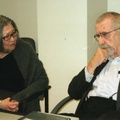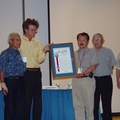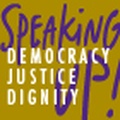In recent years, the Nikkei community has engaged in a renewed discussion to reject the euphemistic and false terms the government used to minimize the unjust and inhumane nature of the Japanese American incarceration.
From 2009 through 2011, the Japanese American National Museum, the Manzanar Committee, the Tule Lake Committee, and UCLA’s George & Sakaye Aratani Chair in Japanese American Incarceration, Redress, and Community organized workshops and community-wide symposiums in Southern and Northern California to stimulate discussion and develop consensus over replacing inaccurate and euphemistic terms that describe the Japanese American experience.
In plenary sessions at the 2010, 2011, and 2012 Japanese American Citizens League National Conventions, the JACL’s grassroots membership overwhelmingly approved a resolution to promote use of accurate and non-euphemistic terminology. Chapter delegates unanimously approved a 14-page Power of Words handbook, “A Guide to Language about Japanese Americans in World War II: Understanding Euphemisms and Preferred Terminology.” It includes a list of euphemisms and suggests more accurate counterparts, including a recommendation to use “American concentration camp” and not “relocation center” when referring to the War Relocation Authority (WRA) camps.
Implicit in these discussions over terminology is the importance of the Japanese American community developing a collective voice, a way to ensure greater control over how our history and experiences are remembered by future generations. Government institutions like the National Park Service that are tasked with interpreting and preserving the shameful story of the Japanese American incarceration must be responsive to community concerns, understanding that the language they use is an important part of presenting a truthful representation of those events.
“Whomever controls the vocabulary, controls the narrative,” Tetsuden Kashima observed at “Cast in Bronze,” the Northern California symposium on terminology held in San Francisco’s Japantown in October 2011. Kashima’s book, Judgment Without Trial, examines the network of prisons that incarcerated persons of Japanese ancestry during World War II. He discussed “internment,” one of the most commonly misused terms; correctly used, it applies to non-U.S. citizens imprisoned by the Department of Justice. Internees, or “enemy aliens,” were protected from mistreatment in the DOJ camps by the Geneva Conventions. Internees enjoyed better food, treatment, and living conditions. In contrast, the WRA concentration camps had no rule of law, and the inmates, most of whom were American citizens, were not protected by the Constitution or the Bill of Rights.
During World War II, the WRA and the U.S. Army deliberately used terms like “evacuation” and “relocation” to summon images of rescue and to obscure violations of civil and human rights. “Camp” sounded like fun and recreation. Propagandistic language left a lasting legacy, creating two classes of Japanese Americans—either “loyal” or “disloyal”—and those who protested the injustice of their mass incarceration were segregated into a scorned class of undesirables—“disloyals” whom the government targeted for mass deportation.
In the early 1970s a generation of Nisei incarceration survivors sought to develop a Japanese American community response to the unjust mass incarceration. These passionate Nisei activists explained the government’s use of lying words and dissembling language to hide a shocking abuse of power.
They include people like JACLer Edison Uno, the father of redress, who wrote “Concentration Camps American-style” (1974); Manzanar Committee’s Sue Kunitomi Embrey, “Concentration Camps, Not Relocation Centers” (1976); Raymond Y. Okamura, “The American Concentration Camps, A Cover-up Through Euphemistic Terminology” (1982); and James Hirabayashi, “Concentration Camp or Relocation Center, What’s in a Name?” (1994).
More recently, Aiko Herzig-Yoshinaga gave us “Words Can Lie or Clarify” (2010); and Seattle JACL activist Mako Nakagawa launched the “The Power of Words” movement within the JACL. Both helped to revive the terminology discussion for a generation that did not experience incarceration. (All papers are posted at: www.nps.gov/tule/forteachers/suggestedreading.htm)
The message each of them have reiterated, decade after decade, is the need for Japanese Americans to stop using the deceptive language of the oppressor. The second message concerns the right and the responsibility Japanese Americans have to define our own experience.
“We don’t need to ask for others for permission to call our experience what we want to call it,” Mako Nakagawa stated emphatically. “Sure, we will listen to what others have to say, but this is about our experience, our history, told from our point of view. No other group or individual has the right to decide if we can use the term ‘concentration camps’ or whatever term we want to use.”
The National Park Service will soon undertake the task of sorting through Tule Lake’s complex and euphemism-laden history to figure out how that history will be written and remembered by future generations. The next few years will challenge Tule Lake’s survivors, the descendants of former inmates, and other Nikkei advocates to work toward ensuring Tule Lake’s extraordinary hidden history is properly told.
*This article originally appeared in the 2013 New Year’s edition of the Nichi Bei Weekly.
© 2013 Barbara Takei





